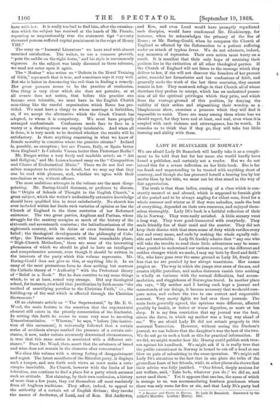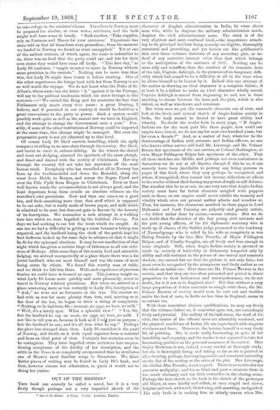LADY DI BEAUCLERK IN NORWAY.*
WE are afraid Lady Di Beauclerk will hardly take it as a compli- ment to be told that but for her name she would hardly have found a publisher, and certainly not a reader. But we do not intend this for a severe reflection on her little book. She is far too frank and unpretending to be treated with anything short of courtesy, and though she has procured herself a hearing less by her merits than by her title, we must not let that stand in the way of fair appreciation.
The truth is that these ladies, coming of a class which is con- stantly sneered at and abused, which is supposed to furnish girls of the period and to be always angling for eldest sons, lived for a whole summer and winter as if they were nobodies, made the best of everything, depended on their own resources, and enjoyed them- selves thoroughly. Lady Di's book is a faithful reflection of their life in Norway. They were easily satisfied. A little scenery went a long way. They were good-humoured with everybody. They made friendly fun of their maid and the courier. They did not keep their diaries with that stern sense of duty which verifies every fact and every name, and ends by making the whole equally reli- able and unreadable. Lady Di frankly admits that "any one who will take the trouble to read these little adventures may be some- what puzzled to understand our various routes, or the different and sudden changes which we made, I may say both by flood and field." We, who have gone over the same ground as Lady Di, freely con- fess that we are puzzled by her abrupt transitions. Her names perplex us. The way in which she jumps over arms of the sea, and creates idyllic paradises, and makes distances vanish into nothing is wholly at variance with the normal difficulties, bad accom- modation, and sluggishness of Norwegian travel. In another place she says, "My mother and I having each kept a journal and memoranda of our doings, it became necessary that we should com- pare notes, and reduce the two to one correct and respectable account. Very merry fights we had over these journals. The main facts generally agreed, the opinions were different, affected possibly by health, or better or worse digestion, or more or less sleep. It is my firm conviction that my journal was the best, minus the dates, in which my mother was a long way ahead of me." We are afraid Lady Di did not submit properly to this maternal it orrection. However, without seeing the Duchess's journal, we can believe that the daughter's was the best of the two. 1Ve do not go to such a book as this for practical information. If we did, we might wonder how Mr. Murray could publish such trea- son against his handbook. We might ask if it is really true that the public executioner in Norway is bound to cut off a head at one blow on pain of submitting to the same operation. We might call Lady Di's attention to the fact that in one place she talks of the groundless fears of her friends, while in other places she shows that their advice was fully justified. "One friend, deeply anxious for our welfare, said, 'Take beds, whatever you do ;' we did so, and never used them." Yet it appears that one inn, the name of which is strange to us, was accommodating fourteen gentlemen where there was only room for five or six, and that Lady Di's party had • A Summer and Winter in Portray. By Lady Di Beauclerk. Illustrated by tha Author's Sketches. Loudon: Murray. 156S. to take refuge in the minister's house. Travellers in Norway must be prepared for similar, or even worse, accidents, and the beds might well have come in handy. "Said another, Take supplies, rely on Fortnum and Mason for your existence.' Experience has since told us that all these fears were groundless ; from the moment we landed in Norway we found no want unsupplied." Yet at one of the earliest stations, of which, again, the name is unfamiliar to us, there was no food that the party could eat, and but for their own stores they would have come off badly. "This first day," as Lady Di confesses, "taught 11Elnever to move in Norway without some provision in the carriole." Nothing can be more true than this, but Lady Di might have learnt it before starting. One of the other experiences she brings back with her from Norway is not so well worth the voyage. We do not know what the Duke of St. Alban's, whose name has the letter " L " against it in the Peerage, will say to the political tendencies which his sister betrays in this sentence :—" We envied the King and his ministers the fact that Parliament only meets every three years : a great blessing, I believe, and if practised in our country it would be doubtless a great convenience to the party in power. Such a system would possibly work quite as well as the annual row we have in England, and the attempt to change the Government once a year." Pos- sibly, if some of the other institutions of Norway could be imported at the same time, this change might be managed. But even the progressive party is not yet educated up to that level.
Of course Lady Di liked carriole travelling, which she aptly compares to riding in an arm-chair through the country. She liked, and learnt to excel in, salmon-fishing. In the winter she skated and went out sledging, admired the spectacle of the snow plough, and dined and danced with the society of Christiania. Her trip through the country did not take her anywhere off the most beaten track. Everybody who has travelled at all in Norway has been up the Gudbrandsdal and down the Romsdal, along the -coast from Molde to Bergen, and across the Signe Fjord and over the Fille Fjeld from Bergen to Christiania. Even on these well known roads the accommodation is not always good, and the least departure from them entails an absolute reliance on the traveller's own provisions. Now and then one comes on a good inn, and finds something more than that stuff which is supposed to be oat cake, but is really made of brown paper, and milk which is admitted to be sour, but does not gain in flavour by the honesty of its description. We remember a rash attempt at a walking -tour into which we were beguiled by the faithless Murray. For -days we bad nothing to eat but the trout which we caught. At one inn we had a difficulty in getting a room because a bishop was expected, and the landlord being the clerk of the parish kept his best bedroom locked up for some days in advance so that it might be fit for the episcopal slumbers. It may be our recollection of that might which has given a certain tinge of bitterness to all our criti- eistn of Bishops. After some days of this scanty food and miserable lodging, we arrived unexpectedly at a place where there was a fat jovial landlord, who eat meat himself and was the cause of meat being eaten by others. We found this worthy man at table, and we think we left him there. With such experience of previous -famine we could have welcomed an ogre. This journey taught us, what Lady Di learnt more quickly and more pleasantly, never to travel in Norway without provisions. But when we arrived at a place answering more or less correctly to Lady Drs description of we were not as fortunate as she was. The courier we bad with us was far more gloomy than hers, and, meeting us at the door of the inn, he began to utter a string of complaints. "Nothing to be had here, Sir ; no meat, no eggs, no beer, no milk." 4' Well, it's a lovely spot. What a splendid view !" "Yes, Sir, but the landlord he say no meat, no eggs, no beer, no milk. I not like to tell you so, because it look as if I told you on purpose ; but the landlord he say, and it's all true what he say." Perhaps the place has changed since then. Lady Di considers it the pearl of Norway, and dwells on it with equal raptures from a material and from an ideal point of view. Certainly her ecstacies seem to be contagious. They have beguiled stern reviewers into unques- tioning acceptance of the fidelity of her description, and the critic in the Times is so completely overpowered that he attributes one of Moore's most familiar songs to Shenstone. We think better pieces of writing may be found in Lady Di's book, and that, however sincere her admiration, to quote it would not be doing her justice.































 Previous page
Previous page